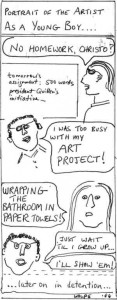Review by Lynda La Rocca
Poetry – October 2006 – Colorado Central Magazine
Across the High Divide
by Laurie Wagner Buyer
Published in 2006 by Ghost Road Press
ISBN: 0-9771272-5-7
I HAVE LONG BEEN A FAN of Laurie Wagner Buyer’s poetry. This is a writer who always lets readers know exactly where she stands, and what she stands for, in language that is at once simple and straightforward, compelling and completely mesmerizing.
In her third poetry collection, Across the High Divide, Buyer goes beyond expressing the feelings, desires, and regrets of a woman who lives, loves, works, and plays as fast and furiously as a summer-afternoon cloudburst in her beloved Colorado high country.
This time Buyer literally rips open her soul to expose the agony and bewilderment that characterize the end of the kind of love we always believe will last forever — until it doesn’t. I know it’s trite to describe a writer as “bleeding all over the page,” but so be it. That is exactly what Buyer does in many of the poems in this 105-page collection. She makes us bleed, too. And then, just when the pain is most intense, she comforts us and guides us back into the light.
This book would be worth its $13.95 price tag just for the two long poems that sandwich the collection and take the reader full circle, from the wild despair of a relationship that has died to the ecstasy of finding love again when, and where, it was never expected. The first poem, Selling Guns, weaves the history of half a lifetime through the guns the middle-aged narrator
“on the edge of insanity
on the verge of divorce after twenty years”
is desperate to get rid of regardless of whether the dealer pays her what they’re worth. These are guns that friends used to kill themselves, guns that she was forced to fire to put down one suicide’s pets, the dog and cats that she could neither care for nor take home. These are guns that the man she once loved used to dispatch the colt she’d “petted and pampered since the day he was born,” guns she feared would kill him or her — or both of them.
What does a woman do when she asks “what’s wrong”
and the answer is “nothing?” . . .
What does she do when her husband tells her,
“I never trusted you
and I don’t believe you ever loved me?”
I want to know how she’s supposed to go on.
BUT GO ON SHE DOES. And in the concluding, 20-page prose poem, The Week of Wanting More, she finds her center and her self again in a wild, wonderful, incredibly erotic love that left me weak in the knees (among other areas of my anatomy).
As the title indicates, this poem depicts the all-encompassing eagerness and insatiable desire of new lovers who “soothed and stroked and touched and tasted until we slept,” only to wake and wander small-town streets and flower-filled meadows, talking, dancing, drinking wine, and eating avocados and plums between “bouts of making love” on the kitchen table, in the claw-footed bathtub, by candlelight, starlight, and daylight, over and over and over again. These lovers want to swallow each other whole; they can’t get enough of each other. And frankly, neither could I.
“Who said love was meant for the young?” asks the besotted poet. Who, indeed? Talk about your paean to life’s endless possibilities. This poem is it.
That said, I’m briefly donning my grammar-cop uniform to note that Buyer’s tendency to ignore capitalization and hyphenation and her penchant for turning what should be one word into two detracts and distracts ever-so-slightly from what is otherwise a fine body of work.
Granted, poets twist and shape and reinvent grammar and syntax to suit their own needs, and that sometimes makes it difficult for readers (and reviewers) to distinguish between stylistic liberties and plain old mistakes. Some of Buyer’s choices may be deliberate, so I’ll defend my position by recalling snippets from last winter’s National Public Radio interview of then-poet laureate Ted Kooser. In cautioning against employing stylistic quirkiness, Kooser gave an example of a poem in which the subject pronoun “I” appears in lowercase. This misusage could be intentional, Kooser explained, but readers wouldn’t know that. They might, therefore, become so caught up in searching the text for additional examples of the “error” that they lose the entire sense of the poem, he opined.
There’s little danger of that here, though. Despite the occasional glitch, Buyer’s meaning is as clear as the high-country sky on a sunny October afternoon. Born of pain yet blossoming with hope, this collection is a “labor of love” in every sense.


